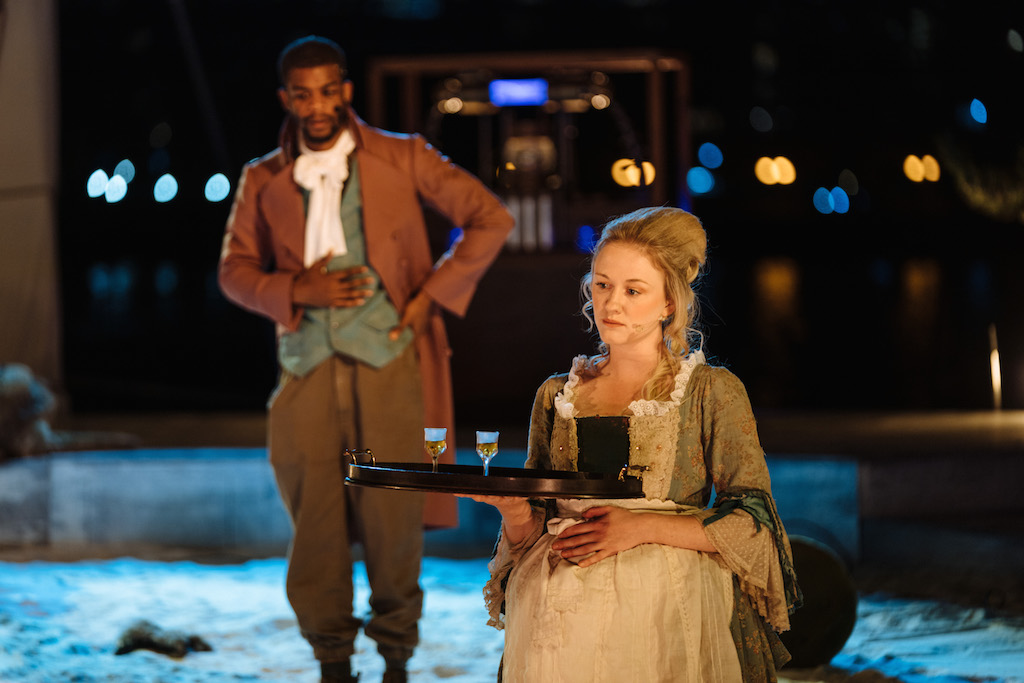The Master Shipwright’s House, Deptford – until 2 October 2022
Reviewed by Claire Roderick
2**
The Gretchen Question is a frustratingly nebulous production, but there are promising elements that could be developed into a fascinating play. Melly Still and Max Barton’s ambitious vision imagines an alternative history of climate change. An Arctic expedition by the Royal Society in the 18th century unearths a mysterious gem that, when powdered, has explosive properties, and is also used as a form of insulation by the Indigenous people. A further expedition is commissioned, and the source of the pearl is discovered – the mysterious Gretchen oyster, named by Joseph Banks (Alex Mugnaioni) as an act of devotion for Gretchen (Lauren Moakes). The scientists’ lack of concern and humanity for the land and the people who live there is shown in quick brushstrokes as the rush to gain control of this wondrous fuel source begins.
In modern day London, influencer Maisie (Yohanna Ephrem) is embarking on a sponsorship deal with Nova – the company originated by the 18th century scientists – and travels to the Arctic to highlight Nova’s environmental credentials. Lulit (Tamaira Hesson) wakes up on an ice rink after Maisie’s launch party with disturbing symptoms and no memory of how she got there. Lulit has been commissioned to record a spoken word piece by Nova, and her quest to find the truth about her missing hours and find the cause of her deteriorating health begins to get in the way.
The story threads intertwine with a lovely rhythm at first: Gretchen and Banks marry and have a child as the money comes rolling in and the demand for oysters soars. As the scientists all become power-hungry, greedy capitalists, Gretchen is the lone voice of dissent, questioning the damage that is being done, and finds an ally in Goethe. Meanwhile, after seeing the true state of the Arctic, Maisie goes off message in her broadcasts, leading her producer, Davina (Katherine Manners) to show her true loyalties. Meanwhile two ice rink workers, Dave (Ryan Gerald) and Dave (Al Nedjari) provide everyman opinions about the floods and whether Maisie’s trip is actually real.
Christopher Saul plays a modern scientific commentator bought in to describe Maisie’s Arctic adventure and has long muddled passages of explanation until he describes in excruciating detail, death by hyperthermia. Sitting on the windy banks of the Thames, we could all sympathise.
I think the confused and confusing second part of the play may be meant to convey the rapid and chaotic deterioration of the ecosystem and climate, as well as Maisie’s body, but it gets so messy it’s hard to tell. There are some beautiful moments that are rushed over, and some sections, mostly focussed on the 18th century characters, which could be cut to make a more cohesive narrative. I am all for chaos, but I think Lulit and the audience deserve even the beginning of an explanation. The movement pieces are exquisite, but lots of what happens between them in the latter part of the play doesn’t fit with what has come before and gets a little repetitive before heading into.
The cast all give committed performances, with Tamaira Hesson’s urgent and lyrical spoken word performance a standout. Max Barton and Jethro Cooke’s gorgeous music adds something special, and E.M. Parry’s intriguing and sympathetic design uses this unique and historical riverside space brilliantly.
Flawed but full of promise, The Gretchen Question is a timely and fervent call for action to combat climate change with some intriguing elements that shine brightly in the jumbled narrative.

